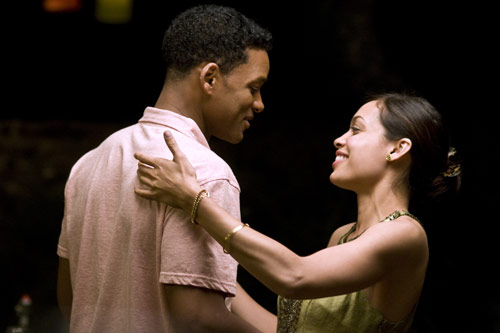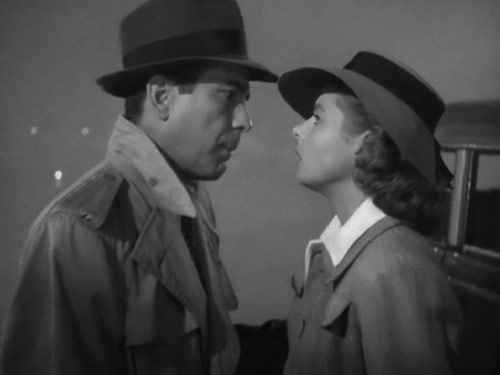
Let me get this out of the way. Seven Pounds is retarded. If this thing didn’t have the star power of Will Smith and Rosario Dawson, Lifetime Network execs would reject it. On an online forum I frequent, someone was curious and asked what the movie was about. My friend Garth described the plotline, and people genuinely thought he was pulling their leg. So when I spoil the plot for you near the end of this review, trust me, you’ll thank me for it.
But rather than focus on the ridiculous contrivances that occur in this film (apparently, stalking people is ok if you’re as handsome as Will Smith) or the irritating way the movie both withholds information (so as to draw out the interminable narrative) and yet foreshadows every single plot point (wait! what’s he doing with that jellyfish??), I thought I’d reflect on the nature of sacrifice in movies.
The theme of someone sacrificing herself for the good of the group is as old as literature itself. It is the hallmark of almost every major religion and a primary motif in too many stories to count. Despite its familiarity, it still packs a wallop, in part because we want to believe that people are willing to do this and because it’s universally admirable when someone does, even if we don’t agree with his motivations.
For Hollywood, the sacrificial hero is the prestigious flip side of the summer blockbuster. In action and comic book movies, the hero is willing to sacrifice himself for the good of the world. But he’s so awesome (and sequels are so lucrative) that the movie contrives to have him survive his ordeal. But at Oscar time, the sacrificial hero must follow through to the bitter but poignant end. The movie seems the more realistic for it, and we have the powerful emotion of pathos to send us out of the theater inspired.

If done well, sacrifice can achieve that inspirational result. Think of the end of Casablanca or almost any quality war movie. But it can also feel cheap and manipulative, as it does in Seven Pounds. Part of the problem is that Will Smith’s sacrifice is so convoluted and so divorced from any kind of reality that the audience shouldn’t take it seriously. When a soldier in a movie falls on a grenade to save his buddies, that sacrifice resonates because we know that’s happened numerous times in real life. When one guy gives up the girl because he knows she’s better off with someone else, we’re inspired by that sacrifice because we can imagine ourselves in similar situations and wonder if we’d be up to the challenge.
But when a character stalks people so that he can decide which ones are worth saving so that he can kill himself and then somehow donate his organs to those specific people, our natural reaction is to scratch our head and wonder who’s writing these scripts. That he’s left his job as a rocket scientist (hmmm, maybe he could’ve done something with that salary that might help the world), that he’s impersonating an IRS agent and no one seems to figure out what’s going on, that he kills himself with a jellyfish he’s dragging around to various motel rooms. Well, you can see why no one believed Garth when he described it.
But Seven Pounds is even more manipulative than that. Self-sacrifice is sometimes not a result of goodness but a response to guilt. Again, that can be a legitimate storyline, but the guilt has to be legitimate. Here, Will Smith has made an awful but understandable mistake. What’s not understandable is how this mistake completely consumes his life. If your friend reacted the way Smith does in this film, you’d quickly have him committed and put on some kind of medication. Here, Will Smith’s friend (Barry Pepper in a thankless role) goes along with this cockamamie scheme.
Why this unrealistic approach? Because Hollywood needs its heroes to be spotless. I would’ve had a lot more respect for Seven Pounds if Will Smith was actually motivated by some horrific crime. Then there would’ve been some ambiguity, some ambivalence over our “hero.†Wouldn’t it be more interesting if he had murdered a child early in his life or embezzled thousands of dollars? Then we could debate whether this kind of guilt deserves a sacrifice and whether the sacrifice could actually redeem the crime. Instead, we just have one more reason to admire our savior--he feels guilty over a mistake that almost anyone could’ve made and he’s willing to die for it. Oh thank you, Will Smith. What would we do without you?



